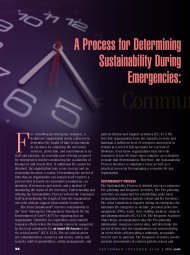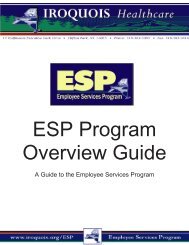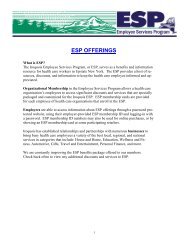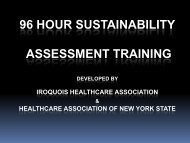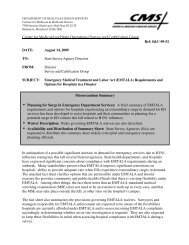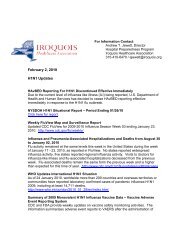NYS Public Health Legal Manual: A Guide for Judges, Attorneys ...
NYS Public Health Legal Manual: A Guide for Judges, Attorneys ...
NYS Public Health Legal Manual: A Guide for Judges, Attorneys ...
You also want an ePaper? Increase the reach of your titles
YUMPU automatically turns print PDFs into web optimized ePapers that Google loves.
NEW YORK STATE PUBLIC HEALTH LEGAL MANUAL § 1.30<br />
[1.30] G. Involuntary Isolation and Quarantine:<br />
Constitutional Standards<br />
[1.31] 1. Substantive Due Process<br />
Involuntary confinement, either by isolation or quarantine, directly<br />
affects a fundamental right—the right to liberty—and the requirements<br />
of substantive due process compel the locality to demonstrate that it has a<br />
“substantial government interest” in that confinement. See Joyner v.<br />
Dumpson, 712 F.2d 770 (2d Cir. 1983). Cf. Beatie v. City of New York, 123<br />
F.3d 707 (2d Cir. 1997) [using “rational relationship” test <strong>for</strong> substantive<br />
due process challenge not involving a fundamental right]. In sustaining<br />
the “substantial government interest” in the involuntary confinement of an<br />
individual, the government must show (1) that the specific individual, in<br />
fact, poses a danger to society, see O’Connor v. Donaldson, 422 U.S. 563,<br />
575 (1975), and (2) that the same basic purpose—sustaining the “substantial<br />
government interest” cannot be achieved by less drastic means, i.e.,<br />
the “least restrictive alternative.” Shelton v. Tucker, 364 U.S. 479, 488<br />
(1960); City of New York v. Doe, 205 A.D.2d 469 (1st Dep’t 1994)<br />
[upholding involuntary isolation of TB patient]; City of New York v. Antoinette<br />
R., 165 Misc. 2d 1014 (Sup. Ct., Queens Co., 1995) [same]; Best v.<br />
St. Vincent’s Hospital, 2003 WL 21518829 (S.D.N.Y. 2003), report and<br />
recommendation adopted, 2003 WL 21767656 (S.D.N.Y. 2003), aff’d in<br />
part, vacated in part, dismissed in part sub nom. Best v. Bellevue Hospital,<br />
2004 WL 2166316, 115 Fed. Appx. 459 (2d Cir. 2004) [upholding<br />
City <strong>Health</strong> Code procedures <strong>for</strong> involuntary isolation of TB patients and<br />
upholding isolation of plaintiff].<br />
[1.32] 2. Procedural Due Process<br />
Deprivation of a liberty interest also requires procedural due process.<br />
Zinermon v. Burch, 494 U.S. 113, 127 (1990). In cases challenging involuntary<br />
civil commitment, the courts have followed the standards of the<br />
seminal case of Mathews v. Eldridge, 424 U.S. 319, 335 (1976), in determining<br />
the adequacy of the commitment and retention process—requiring<br />
a weighing of the risk of erroneous deprivation of a person’s liberty<br />
(including the possible value of additional safeguards) against the government’s<br />
interest in the confinement (which can include consideration of fiscal<br />
and administrative burdens). See Project Release v. Prevost, 722 F.2d<br />
960, 975-76 (2d Cir. 1983). In civil commitment cases, procedural due<br />
13




